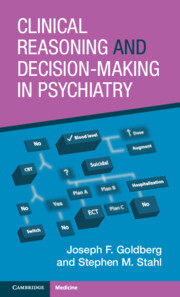Book contents
- Clinical Reasoning and Decision-Making in Psychiatry
- Reviews
- Clinical Reasoning and Decision-Making in Psychiatry
- Copyright page
- Contents
- Foreword
- Preface
- 1 Making Sense of the Senseless: How to Gather and Organize Pertinent Information
- 2 The Approach to Diagnostic Ambiguity
- 3 What the Patient Isn’t Telling You: When Seeing Is Not Believing
- 4 Shared Decision-Making
- 5 Deciding on Appropriate Treatment Modalities: Medication, Psychotherapy, Hospitalization, and Other Levels of Care
- 6 Measurement-Based Care and Applying Statistical Concepts to the Individual Patient
- 7 Hypothesis-Testing and Crafting Patient-Specific Decision Trees
- 8 Decision Points in Iterative Pharmacotherapy
- 9 Hierarchical and Complex Pharmacotherapy Decision-Making
- 10 Prioritizing the Components of Any Decision-Making Model
- Index
- References
8 - Decision Points in Iterative Pharmacotherapy
Published online by Cambridge University Press: 25 March 2024
- Clinical Reasoning and Decision-Making in Psychiatry
- Reviews
- Clinical Reasoning and Decision-Making in Psychiatry
- Copyright page
- Contents
- Foreword
- Preface
- 1 Making Sense of the Senseless: How to Gather and Organize Pertinent Information
- 2 The Approach to Diagnostic Ambiguity
- 3 What the Patient Isn’t Telling You: When Seeing Is Not Believing
- 4 Shared Decision-Making
- 5 Deciding on Appropriate Treatment Modalities: Medication, Psychotherapy, Hospitalization, and Other Levels of Care
- 6 Measurement-Based Care and Applying Statistical Concepts to the Individual Patient
- 7 Hypothesis-Testing and Crafting Patient-Specific Decision Trees
- 8 Decision Points in Iterative Pharmacotherapy
- 9 Hierarchical and Complex Pharmacotherapy Decision-Making
- 10 Prioritizing the Components of Any Decision-Making Model
- Index
- References
Summary
More often than not, an initial intervention in psychiatry requires modification. Sometimes sooner than later, the clinician must judge whether a medication dose needs adjustment, an augmentation is warranted, or an outright change should occur when something has been tried and deemed to be unsuccessful. Perhaps a new additional diagnosis comes to light (such as alcohol or substance use disorder) requiring its own treatment. Or an insurmountable medication intolerance develops. Or the originally identified target symptoms worsen, metamorphose, or persist long enough after a previous medication change to warrant a further alteration. Other times, changes to a regimen happen not necessarily because sufficient time has elapsed to deem a change necessary, but because a patient’s (or significant other’s) capacity to tolerate negative affect or other elements of distress become saturated, prompting entreaties or outright demands to “do” something that seems more proactive. In all such instances, there is seldom if ever only one correct approach to iterative pharmacotherapy.
- Type
- Chapter
- Information
- Clinical Reasoning and Decision-Making in Psychiatry , pp. 209 - 241Publisher: Cambridge University PressPrint publication year: 2024

